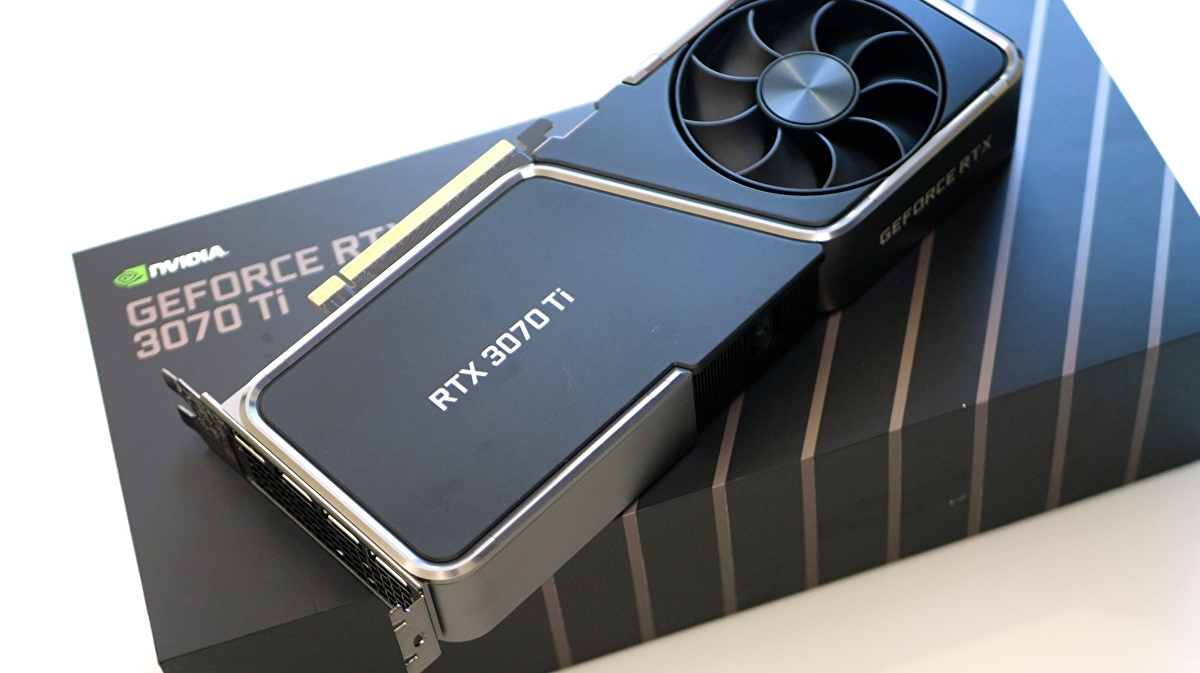A solid offering with questions about its ongoing availability. Though the top dog 3080 Ti GPU gets most of the attention, the RTX 3070 Ti is arguably the more important release of the two. It’s a lot more affordable and it’s a compelling upgrade for users coming from older generation cards. Even with street prices that are grossly inflated, it offers 2080 Ti-beating performance at 2080 Ti-like prices. Can we interpret that as a small win in the current market?
Nvidia GeForce RTX 3070 Ti Founders Edition Review
The card itself is visually identical to the RTX 3070. For a card with a 290W TDP, it’s very compact and its two-slot design will appeal to builders of compact systems. The cooler can be considered a hybrid of a blower and axial fan designs, and it’s clear that Nvidia really put a lot of effort into it. There are triple DisplayPort 1.4 a ports and a single HDMI 2.1 port.
The Cores
Like all 3070 Ti cards, the Founders Edition uses the fully enabled GA104 GPU with 6,144 Cuda cores which run at a boost clock of 1,770 MHz, a slight increase from the 1,730MHz of the 3070 FE. The extra core and frequency bump helps, but the real benefit comes from the shift to faster GDDR6X memory, which runs at 19Gbps compared to the 14Gbps of the 3070. GDDRX is power hungry though, and it contributes to the 3070 Ti FE’s 290W TDP which is a whopping 70W increase over the 3070 FE. It comes with Nvidia’s proprietary 12-pin power connector. We’re happy to see one connector vs the unsightly three of high-powered cards, but its mid card placement isn’t ideal for clean build purists.
Despite its advertised 1,770MHz boost clock, our sample was happy running at 1,900MHz over a looping test. Its peak recorded temperature was 79c, which is about the maximum before you’ll start to lose a little bit of boost clock. The cooler is audible but given its compact size, we have nothing but praise for Nvidia’s FE coolers. The card recorded a peak gaming power consumption of 288w, which is over 60w more than we saw from the 3070 FE. That’s a bit disappointing.
4K on the Up
Given that we have GA104-based cards on the market, the 3070 Ti FE performed as we expected it to. It draws alongside the RX 6800 but it remains some way off of the RTX 3080. The FE was surprisingly close to the more expensive MSI but it was equally surprisingly some way off the monstrous Aorus Master. It can handle modern 4K games but it’s probably best suited to a user of a high refresh rate 1080p or 1440p monitor. It’s 8GB frame buffer is enough for now, but will it be in the future? Time will tell.
The Nvidia GeForce RTX 3070 Ti Founders Edition is an attractive offering in some ways, particularly if your games can make use of the increasingly impressive DLSS technology, but at the same time it doesn’t really standout. Both the relatively minor performance gain tied to a major TDP bump over the non-Ti 3070 means that 3070 remains the better buy to us. Then there’s the very competitive AMD RX 6800, which has twice the memory. In a normal market the 3070 Ti FE could be a compelling option. But, with availability an ongoing concern, it’s not a great buy right now.
Conclusion
The steep rise in power consumption for not much of a performance gain leaves us a bit lukewarm on the 3070 Ti.

